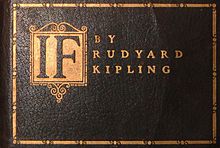If—
If— is a poem by Rudyard Kipling . It was written in 1895 and first published in the Rewards and Fairies poetry collection in 1910 .
Similar to William Ernest Henley's poem Invictus , it depicts the serenity that was considered a virtue in the Victorian era and is still considered a quintessentially British quality to this day.
“If—” inspired many parodies and is still considered one of the most important poems in the English language. In 1995, it was voted the most popular poem in a BBC poll .
According to Kipling's autobiography Something of Myself (published in 1937, after Kipling's death), the poem was inspired by a military operation, the Jameson Raid . This military operation intensified the conflicts that later led to the Second Boer War . However, the British press portrayed Jameson as a hero and the British defeat as a victory.
content
The title of the poem (“If—”) means “If—” or “If—” and introduces the description of a virtue.
For example, the first stanza says:
- "If you can wait and not be tired by waiting,"
- "If you can wait and don't get tired of waiting"
After listing various virtues, such as sincerity, humility, an eye for the essentials and self-discipline, the conclusion comes:
- "Yours is the Earth and everything that's in it,
- And - which is more - you'll be a Man, my son! "
- "Yours is the earth [then] and everything that is on it,
- and - more importantly - you will be a man, my son! "
Reactions
Kipling himself wrote in Something to Myself that he was surprised by the popularity of his poem, how it is hung in offices and bedrooms, and how it has been anthologized ad nauseam.
TS Eliot wrote in his essays about Kipling's works that the poem was a “great verse” (in German: a great poem).
“If—” in other works
“If—” is often quoted in English-language literature and films, among other things. The following cases are mentioned as an example:
- The verses "If you can meet with triumph and disaster / And treat those two impostors just the same" ("If you can deal with victory and defeat / And can treat these two blenders the same") are above the entrance to Center Court in Wimbledon , London .
- The poem is referred to in the film White Squall .
- In the novel Bridget Jones - On the Verge of Madness by Helen Fielding , the poem also plays a role and is quoted in full.
- The song If- of Joni Mitchell , published in 2007 on the album Shine is also inspired by Kipling's poem.
- The poem is also featured in the military science fiction novel The Bronze Battalion by John Ringo and David Weber .
- The Two Imposters episode of the Boardwalk Empire series borrows from this poem.
- The poem is also mentioned in the novel The Midnight Rose by Lucinda Riley
Translations
“If—” has been translated into different languages. Kipling himself spoke of 27 languages. A translation comes from the Burmese Nobel Peace Prize laureate Aung San Suu Kyi , who translated the poem into Burmese. Another translation was made by Nobel Prize winner Ivo Andrić .
Web links
- Recording of If- on LibriVox
- German translation of If—
Individual evidence
- ↑ Fordham.edu: Modern History Sourcebook
- ↑ Rudyard Kipling: Something of Myself , Chapter VII
- ↑ Helen Fielding: Bridget Jones: The Edge of Reason . books.google.de
